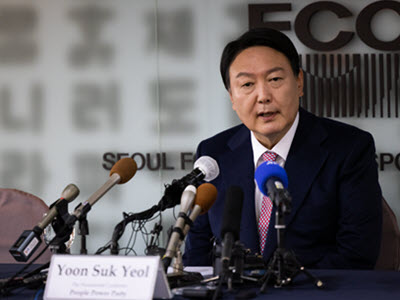The Election of Yoon Suk-yeol and Implications for the United States
U.S.-ROK Economic and Technology Cooperation
This commentary by June Park is part of the roundtable “The Election of Yoon Suk-yeol and Implications for the United States.”
The election of Yoon Suk-yeol as the next president of the Republic of Korea (ROK) on March 9 has increased optimism for U.S.-ROK economic cooperation and even the creation of a tech alliance. Many in Washington believe that since Yoon supports strengthening the U.S.-ROK alliance, the United States will be able to more effectively conduct its foreign economic policy agenda vis-à-vis South Korea than during the Moon administration. While the political orientation of Yoon and his campaign advisers suggests the possibility of deeper economic cooperation, there exist several impediments.
Yoon has vouched to make South Korea a “hyper semiconductor superpower,” in which 100,000 candidates would be discovered and trained for the domestic semiconductor industry. Samsung and SK Hynix are both heavily recruiting domestic talent to step up to the next level in semiconductor production. The focus will be on expanding the sector to compete globally in the production of non-memory chips via fabless manufacturing and foundries. In this regard, the expectation that South Korean companies will tilt completely toward the United States in a “tech alliance” is an overestimation of the potential for cooperation. The main contenders in chip manufacturing—Samsung, TSMC, and Intel—are essentially rivals. Guarding intellectual property for state-of-the-art chip technology and maintaining market share based on orders received on a quarterly basis are critical to their standing.
The United States, for its part, seeks to overcome the current supply crisis in chips through both investment in the U.S. semiconductor industry through the CHIPS for America Act and contributions from South Korea and Taiwan. But the actual applications of export control mechanisms via the Entity List is far from transparent. South Korean companies are concerned about diverging treatment of petitions for waivers (with preference being given to U.S. producers). The United States is perceived to be establishing for itself an economic autarky for high-end semiconductors, requiring South Korean firms to proactively lobby the U.S. government for their business stakes and interests. Both Samsung and SK Hynix likely will try to offset the insecurities from the lack of transparency in U.S. policies by also pursuing business opportunities with China via their factories in Xi’an and Wuxi, respectively, as long as their U.S. competitors are doing the same.
It is crucial to recognize that government interests will not always align with business interests. Given the comparative landscape of South Korea’s foundry operations in China and the United States, any U.S. government support should be equally distributed to South Korean firms to retain cooperation. The Entity List should also be enforced in a transparent and equitable manner.
In the case of electric vehicles (EVs) and batteries, a cooperative mechanism between the U.S. automakers and South Korean battery producers to manufacture lithium-ion batteries in the United States is in progress. Yet, while South Korean battery makers have pledged to build factories in the United States, this effort is mainly to stave off the expansion of China’s Contemporary Amperex Technology Co. Limited (CATL) in the U.S. EV battery market. Each South Korean EV and battery maker is setting up an office for lobbying in Washington, D.C., to maneuver U.S. policies and secure market share. However, it is important to note that, as in the case of semiconductors, South Korean EV and battery makers will be vying for global competition, diversifying their corporate strategies.
A geopolitical challenge for Yoon’s foreign economic policy is ongoing tension with Japan. Japan’s requirement for resuming conversations with South Korea has been the reversal of the 2018 Supreme Court ruling on recognizing individual petitions for unpaid forced labor during World War II and subsequent seizures of Japanese assets. While the Japanese government denies any policy linkages, the decision prompted Japan to engage in export controls on photoresist, hydrogen fluoride, and polyimides for South Korea’s semiconductor production from July 2019. Japan has demanded that South Korea come up with a solution on its own that Japan can accept in order to resume the talks. Yoon has pledged to “address the past issues together (with Japan) and look to the future,” implying anticipation of Japan’s active participation in talks.
Any U.S. pressure on Yoon to reverse the ruling could inflame anti-Japanese sentiment in the South Korean public. At the time of the Japanese export controls in July 2019, the United States adopted a neutral position. As a result of the restrictions, DuPont has taken over a considerable share of the South Korean photoresist market. Given the risk perception by South Korean firms and their shifts toward domestic production and alternatives, finding a common strategy to defuse historical tensions will not be easy even if South Korea is restored on Japan’s export whitelist.
Although the overall policy directions proposed by Yoon may be “music to Washington’s ears,” South Korea and the United States may not see eye to eye on specific points in technological or trilateral cooperation. Moreover, government policies will not always be aligned with business interests as they seek profit. Such challenges, coupled with the divided public evidenced by Yoon’s narrow margin of victory in the election (0.7%), indicate the uncertain path ahead in directly linking Washington’s hopes with the interests of the South Korean public.
June Park is a Political Economist and Fung Global Fellow at the Princeton Institute for International and Regional Studies (PIIRS) at Princeton University.



